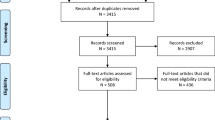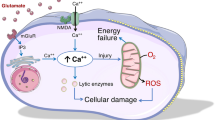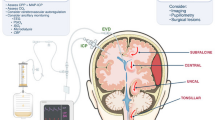Abstract
This study examines a series of coronary artery bypass patients (CABS) for neuropsychological and regional cerebral blood flow (RCBF) changes at 8 days and 8 weeks post surgery. Seventy-three percent were found to have moderate or severe neuropsychological deficits at 8 days post operation and 37% at 8 weeks post surgery. A comparison group of major vascular and thoracic surgery patients was also found to have a significant proportion of neuropsychological deficit following surgery. The RCBF assessments indicated a significant drop in mean RCBF at 8 days post surgery in the coronary artery bypass group which did not persist to 8 weeks. The comparison group showed no changes in RCBF following surgery. The findings suggest different patterns of recovery and origins of the neuropsychological deficit in the two groups and emphasize the need for appropriate control groups in studies examining the cortical effects of extracorporeal circulation.
Similar content being viewed by others
References
Aberg, T., & Kihlgren, M. (1977). Cerebral protection during open-heart surgery.Thorax, 32, 523–533.
Aberg, T., Ronquist, G., Tyden, H., Brunnkist, S., Hultman, J., Bergstrom, K., & Lilja, A. (1984). Adverse effects on the brain in cardiac operations as assessed by biochemical, psychometric, and radiologic methods.Journal of Thoracic and Cardiovascular Surgery, 87, 99–105.
Abrams, L.D. (1967). Neurological complications of cardiac surgery.Proceedings of the Royal Society of Medicine, 60, 855–860.
Bortner, R.B. (1969). A short rating scale as a potential measure of pattern A behavior.Journal of Chronic Disease, 22, 87–91.
Blauenstein, U., Halsey, J., Wilson, E., & Risberg, J. (1977). 133 Xenon inhalation method. Analysis of reproducibility: Some of its physiological implications.Stroke, 8, 92–102.
Braunwald, E. (1983). Editorial retrospective: Effects of coronary artery bypass grafting on survival.New England Journal of Medicine, 369, 1181–1184.
CASS Principal Investigators and their Associates (1983a). Coronary artery surgery study (CASS): A randomized trial of coronary artery bypass surgery. Quality of life of patients randomly assigned to treatment groups.Circulation, 68, 951–960.
CASS Principal Investigators and their Associates (1983b). Coronary artery surgery study (CASS): A randomized trial of coronary artery bypass surgery. Survival data.Circulation, 68, 939–950.
Ellis, R. (1982). Cerebral dysfunction following cardiopulmonary bypass. In J. Utley (Ed.),Pathophysiology and techniques of cardiopulmonary bypass. Baltimore, Md: Williams and Wilkins.
English, T., Bailey, A., Dark, J., & Williams, W. (1984). The U.K. cardiac surgical register, 1977-82.British Medical Journal, 289, 1205–1208.
Henriksen, L. (1984). Evidence suggestive of diffuse brain damage following cardiac operations.Lancet, 1, 816–820.
Savageau, J., Stanton, B., Jenkins, C., & Klein, M. (1982a). Neuropsychological dysfunction following elective cardiac operation: Early assessment.Journal of Cardiovascular and Surgery, 84, 585–594.
Savageau, J., Stanton, B., Jenkins, C., & Fraser, R. (1982b). Neuropsychological dysfunction following elective cardiac operation: A six-month reassessment.Journal of Cardiovascular and Surgery, 84, 595–600.
Shaw, P., Bates, D., Cartlidge, N., Heavside, D., Julian, D., & Shaw, D. (1985). Early neurological complications of coronary artery bypass surgery.British Medical Journal, 291, 1384–1387.
Smith, P., Treasure, T., Newman, S., Joseph, P., Ell, P., Schneidau, A., & Harrison, M. (1986). Cerebral consequences of cardiopulmonary bypass.Lancet, 1, 823–825.
Smith, T. (1984). Consensus on cabbage.British Medical Journal, 289, 1477–1478.
Society of Thoracic and Cardiovascular Surgeons of G.B. and Ireland (1984).Returns of the U.K. Cardiac Surgery Register.
Taylor, K. (1982). Editorial: Brain damage during open-heart surgery.Thorax, 37, 873–876.
Treasure, T., Harrison, M., Newman, S., & Smith, P. (1986). Letter: Neurological complications of coronary artery bypass surgery.British Medical Journal, 293, 625.
Author information
Authors and Affiliations
Additional information
In addition, the project received generous support from the special trustees of the Middlesex Hospital.
Rights and permissions
About this article
Cite this article
Newman, S., Smith, P., Treasure, T. et al. Acute neuropsychological consequences of coronary artery bypass surgery. Current Psychology 6, 115–124 (1987). https://doi.org/10.1007/BF02686616
Published:
Issue Date:
DOI: https://doi.org/10.1007/BF02686616




